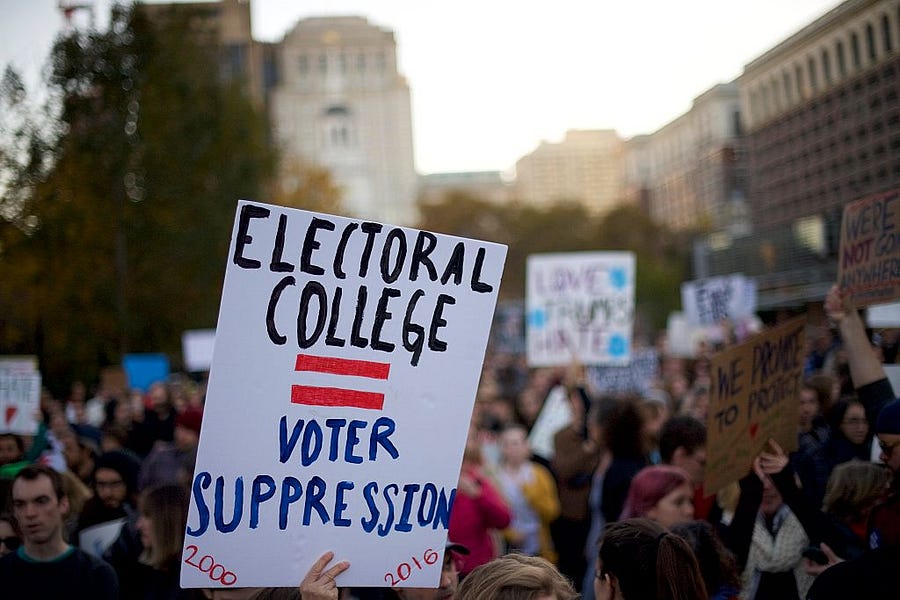“Elections have consequences,” President Donald Trump said in the opening minutes of the debate on Tuesday night in defense of the rushed nomination and impending confirmation of Amy Coney Barrett to the U.S. Supreme Court.
There is a hint of irony that this cynical turn of phrase, originally coined by President Barack Obama to justify his own power politics, has now become emblematic of U.S. conservatives, commenting both on domestic and international matters.
Hungary’s Prime Minister Viktor Orbán, for example, has rewritten the rules of the political game in Hungary but “this is, of course, the nature of democracy in a parliamentary system when a party or coalition of parties has a strong majority,” according to the Hudson Institute’s John Fonte. In Michael Brendan Dougherty’s view, Orbán’s reforms, such as the new electoral system and the defanging of the constitutional court simply “strengthened the majoritarian features of Hungary’s constitution.” If you’re criticizing them, you’re effectively “criticizing Hungary for being democratic.”
In a way, Orbán’s defenders have a point. In the 2010 election, his party, Fidesz, indeed received more than 52 percent of the popular vote. If anyone can reasonably claim to be the authentic voice of “the people,” as populists invariably do, it is him. The defense is also consistent with the distinction made by John O’Sullivan between a “majoritarian view of democracy” and “post-democracy”—in which courts, international treaties, and bureaucratic agencies supposedly make decisions once under the control of Congress and parliaments.
At the same time, it is odd to hear the argument from U.S. conservatives. At other times, they would be the first ones to (rightly) defend the integrity of the U.S. constitutional architecture against efforts from the political left to make politics more “responsive” to the will of the voting public by abolishing the Electoral College, ending the filibuster (or the Senate itself), or packing the Supreme Court. For most on the right, such outcomes would not be a desirable improvement over the status quo or even a neutral “strengthening of majoritarian features” of America’s democracy, as similar reforms have been characterized in Hungary or Poland, but squarely “the death of our country as we know it.”
Paradoxically, while Donald Trump is frequently compared to his populist counterparts in Europe, his own path to the presidency was distinctly unpopulist in the sense that a plurality of Americans voted for his opponent in the 2016 election. And even if he wins again in November, it will be thanks to the peculiarities of the Electoral College—not because he would have an unequivocal majority of Americans behind him. That does not make his election illegitimate, as some on the left suggest, but it does make him an odd tribune of America’s supposedly voiceless majority.
The favorite argument of conservatives for Donald Trump—namely “but, the judges”—is also decidedly anti-majoritarian. The rationale behind populating the judiciary with legal minds who agree “that the state exists to preserve freedom, that the separation of governmental powers is central to our Constitution, that it is emphatically the province and duty of the judiciary to say what the law is, not what it should be,” as the Federalist Society characterizes its own mission, boils down to the idea that there is something special about the constitutional principles behind America’s founding and that those require protection against the vagaries of everyday politics.
In practice, it means not only courts that will refrain from the “post-democratic” “judicial activism” which conservatives deplore, but who will be also pushing back against Congress and the executive branch whenever those transgress against the boundaries set forth by the Founders.
To be sure, a mirror image of the same contradiction exists on the political left, which recoils at Donald Trump’s violations of political norms, not to speak of the rise of populism in countries such as Hungary and Poland. Simultaneously, it is calling for wholesale and possibly unconstitutional changes to the rules guiding political competition in the United States.
Political partisans on either side can’t have it both ways. Either popular majorities are supposed to reign supreme—in which cases the institutions filtering them and hampering their excesses are obsolete and illegitimate—or democratic decision-making ought to take place only within a context of rules, checks and balances, and judicial review, all of which should be very difficult to alter and kept immune from the whims of political majorities of the moment.
It is often suggested that the rise of populism has made the distinction between the political left and right obsolete. The new chasm, however, might not run, as the conventional narrative suggests, between defenders and opponents of “open society” and “globalism.” Rather, it is opening between those who see institutions in liberal democracies as optional, or perhaps as superfluous relics of the past, and those who find them valuable and believe that the threshold for overhauling them should be extremely high, even if it is politically inconvenient. I certainly hope that I am not alone in the latter category.
Dalibor Rohac is a resident scholar at the American Enterprise Institute. He is on Twitter @DaliborRohac.
Photograph by Mark Makela/Getty Images.








Please note that we at The Dispatch hold ourselves, our work, and our commenters to a higher standard than other places on the internet. We welcome comments that foster genuine debate or discussion—including comments critical of us or our work—but responses that include ad hominem attacks on fellow Dispatch members or are intended to stoke fear and anger may be moderated.
You are currently using a limited time guest pass and do not have access to commenting. Consider subscribing to join the conversation.
With your membership, you only have the ability to comment on The Morning Dispatch articles. Consider upgrading to join the conversation everywhere.